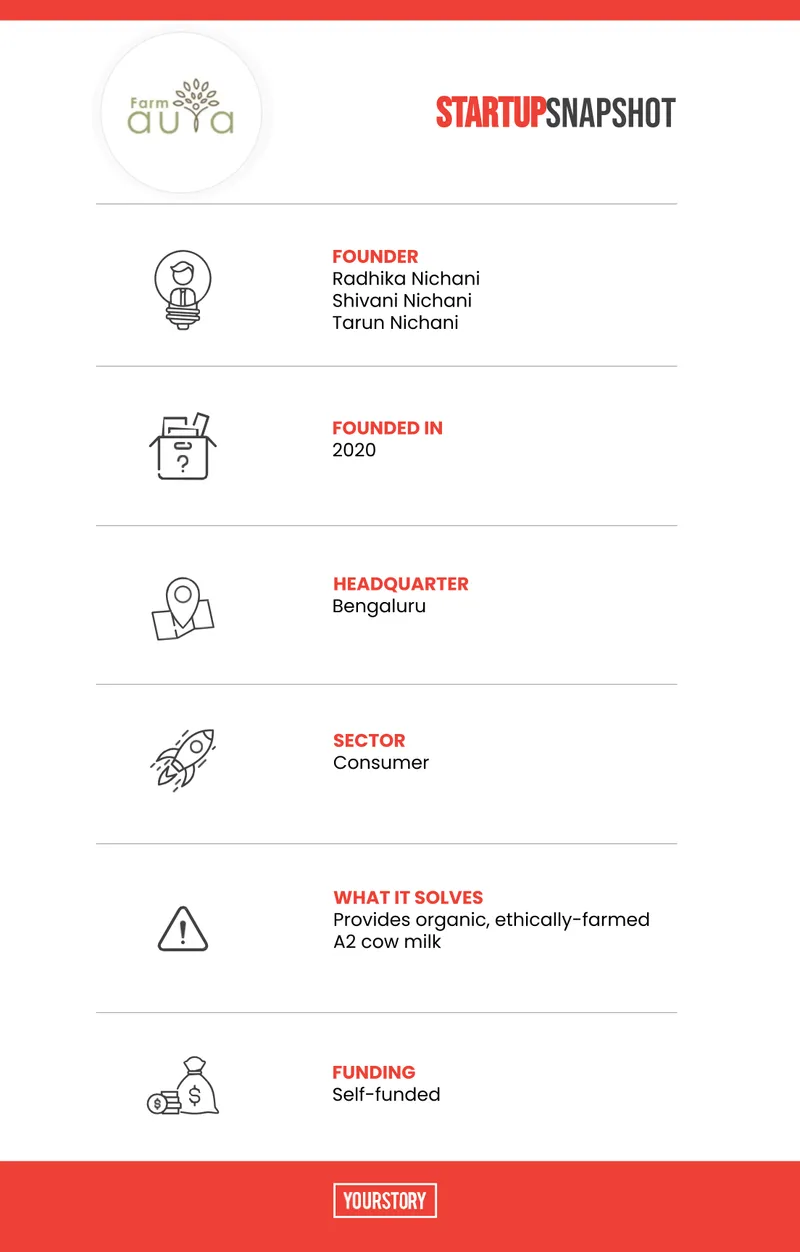How this Bengaluru startup is creating the blueprint for sustainable and cruelty-free dairy farming
Founded in 2020 by an architect, Farm Aura is a Bengaluru-based boutique dairy startup that employs cruelty-free dairy farming techniques to sell dairy products. The self-funded venture hopes to one day open its farms for homestays.
While volunteering at Charlies Animal Rescue Centre (CARE) in Bengaluru, architect Radhika Nichani witnessed first-hand the horrors animals faced on the streets of India on a daily basis. One bad case of animal cruelty after another prompted her to read about animal cruelty cases, and, during one such deep dive, she stumbled upon some literature about the many ways in which the industrial complex had exploited animals to build businesses and test human products.
One such industry, she realised, was dairy.
Some call it the most exploitative trade in the world where animals are not treated like living beings — just money minting machines.
India, however, had a very different, sustainable approach to dairy farming, at least in the past.
“If you look into the history of the White Revolution, you would know that India was filled with only desi cows. While these cows gave the best quality milk, they wouldn’t yield more than six or seven litres at once,” Radhika tells YourStory.
But when the British arrived, they brought with them a gluttonous demand for dairy products like butter and cheese. India-bred cows fell short of meeting the increased demand though, quips Radhika. So, they modified the genetic makeup of cows — changing just one gene — which doubled the output of milk to 20 litres per round of milking
That led to rampant unnatural breeding, unsustainable and exploitative practices in India, that has today not only led to the mistreatment of dairy animals, but also dented the quality of milk produced by cows.
Research surveys by independent agencies, as well as international outfits such as PeTA, fortified by on-ground visitations, have uncovered the horrific ways in which dairy animals are abused such as artificial insemination using dirty, unhygienic equipment and done forcefully, calves being snatched away from their mothers right after birth, culling animals if their milk output drops by a single litre, etc.
The realisation that one of India’s biggest businesses — once responsible for the country’s economic revival — was now being used to exploit animals did not sit well with Radhika, and she decided to do something about it.

Cows at Farm Aura (Image credit: Farm Aura on Instagram)
Ethical dairy practices
In 2020, Radhika, along with her father, Tarun Nichani, and her mother, Shivani Nichani, founded , a sustainable A2 milk startup that rescues desi cows that have been abandoned for jersey/genetically modified ones.
Farm Aura’s USP is that it does not follow demand and only supplies what its animals produce.
In fact, if there’s a new mother cow in the herd, she is milked only once the calf has had its fill for the day — the leftover milk is what goes to Farm Aura’s customers.
“We are an ethical, honest, and natural farm — we ensure our calves are well taken care of, we don’t care if they’re male or female,” Radhika says, adding the animals are as much a priority for the business as customers and sales, if not more.
Based out of Bengaluru, Farm Aura delivers some products pan India, but currently, most of its fresh products such as milk, cheese, cottage cheese etc are sold to customers in Bengaluru.
A model for sustainable dairy farming
Radhika says her ultimate goal is to create a model for sustainable dairy farming for other companies, and lead by example to show that it is possible to be profitable, generate money, and still be humane.

Shivani Nichani, one of Farm Aura's founders (Image credit: Farm Aura on Instagram)
“We hope someday, our business principles and values would serve as a role model in setting standards for other farmers in the area. We want them to grow as we grow. That would mean true success for us,” Radhika quips.
The self-funded startup currently sells A2 cow milk — the highest quality milk produced by desi, indigenous cows — and milk products such as ghee, cottage cheese, etc. It also sells the milk of a small number of donkeys. The startup recently started selling donkey milk soaps and is looking to export them.
Like most dairy companies, Farm Aura sells via a subscription service, and allows customers to place orders for milk products separately. The milk is bottled fresh every morning, and customers are asked to empty out the bottles in their own vessels once they receive their orders — a hat tip to the traditional milk delivery of the yesteryears which ensures sustainability and is far more eco-friendly and safe for consumption than milk in plastic pouches.
The startup, which started services in November 2020, has over 50 regular customers, and sells 250 litres of milk a week. It often sees high demand, but has to turn many customers away because of its policy of only selling what it’s able to collect.

Sonu - Farm Aura's oldest resident. (Image credit: Farm Aura on Instagram)
Its farm is located in Solur — around 45 kilometres away from Bengaluru city — and houses 40 kangrej and kangeyam cows, indigenous to India. The herd is led by Sonu, a halliker calf who had been rescued in the nick of time from the slaughterhouse.
Business model and the future
Farm Aura is self-funded, and any revenue it makes goes back to taking care of its resident animals and paying the salaries of the local villagers it employs to take care of its operations. In the future, Radhika says she hopes to open up the farm for stays, conduct educational workshops, and teach people to live sustainably.
Dairy companies that follow similar sustainable practices or are at least trying to include the likes of Akshaykalpa, Ahimsa Milk, and Swarg Foods. Its competitors also include other broad-scale dairy companies.

As the world’s largest milk producer producing 188 million mega-tonnes of milk in 2019-20, India’s dairy industry has major ramifications on the country’s GDP, as well as employment levels. Nearly 70 million farmers in India are associated with the dairy industry, which has grown at a significant pace over the last five years because of the proliferation of D2C and improved logistics channels.
According to a ResearchandMarkets report, India’s dairy market was valued at Rs 11,357 billion in 2020.
Edited by Kanishk Singh










